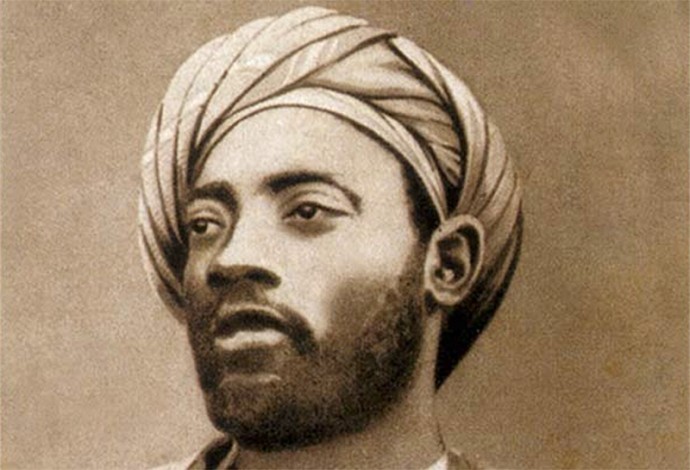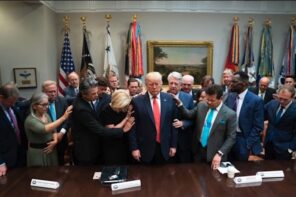A few quick hits to start this week’s recap:
- The Washington Blade’s Michael Levers reported last Friday that six members of Congress urged the US Agency for International Development to use funds from the Central America Regional Security Initiative to support LGBT advocacy efforts in Guatemala, El Salvador and Honduras, where anti-LGBT violence is pervasive.
- The European Court of Human Rights has ruled that Turkey should not have forced a transgender man to get sterilized prior to being given access to transition-related surgery. More from the Advocate.
- IKEA announced it was shutting down its magazine in Russia to avoid violating the country’s anti-gay “propaganda” law.
- Designers Domenico Dolce and Stefano Gabanna set off a social media firestorm (#BoycottDolceGabbana) after comments declaring “traditional” families the only real families, opposing adoption by same-sex couples, and decrying children born through IVF as “synthetic children.” They have since apologized.
- The Presbyterian Church USA voted to change the church’s constitution to include marriage for same-sex couples.
Indonesia: Muslim Clerics Issue Fatwa Calling for Death Penalty for Gay Sex
A Muslim clerical group issued the fatwa against “deviant sexual behavior,” according to Pink News, saying, “Sodomy, homosexuals, gays and lesbians in Islamic law are forbidden and [it] is a vile act that is punishable by the death penalty.”
Homosexuality is not illegal in most of Indonesia, though the province of Aceh and some municipalities have criminalized gay sex acts The head of the Indonesian Ulema Council told The Jakarta Globe: “It doesn’t matter that they love each other. The law still prohibits it. In Islamic law, it’s a sexual act that must be heavily punished. It would be bad if the government allows same-sex marriage.”
Peru: Congressman cites Hitler in opposing civil unions
We noted last week that civil union legislation was blocked in Peru, and that a Catholic bishop had called the legislation’s sponsor a faggot – “maricon.” This week, it was reported that right-wing Congressman Ruben Condori Cusi cited Adolf Hitler in justifying his opposition:
Peruvian Nationalist Party Congressman Ruben Condori Cusi made the comments late last week telling Arroba Radio that Hitler wasn’t wrong about everything.
‘I read Mein Kampf by Hitler … and in some parts he’s right, because some types of misconduct are generated by a certain kind of life,’ Congressman Cusi said.
‘Homosexuality is more or less a kind of misconduct.’
Cusi went on to say that men and women should only have certain roles in life and that lesbians were only that way because they hated men.
‘Washing, ironing, cooking, is unique to the female gender … a woman only becomes a lesbian out of resentment [of men],’ he said.
Cosas Magazine Photogrpaher Victor Idrogo has posted photographs of LGBT rights demonstrations in Peru following the defeat of the civil unions bill.
Africa: LGBT developments in 2014; challenging ‘homosexuality is un-African’ trope
In a report published by Heinrich Böll Stiftung, The Green Political Foundation in Germany, Eric Gitari of the National Gay and Lesbian Human Rights Commission reviews LGBT-related legal, political, and cultural developments in Africa in 2014, both pro- and anti-equality, including many stories we have covered here. He ends with a cautionary discussion of what he calls “The elephant in the room.”
The international community must be led by the advice and priorities of domestic groups before speaking to or engaging with African governments on matters touching on queer equality due to the hazardous weaponization of queer equality as a political tool in sovereignty battles between Africa and the west. Caution must be had before diplomats and heads of states from the west make any LGBTIQ themed statements to African leaders in any forum. Such engagements must also integrate the struggles for gender equality, adequate sanitation, safe housing, maternal health, poverty, insecurity and other broader concerns that do not isolate LGBTIQ issues as an elephant in the room…
The queer diaspora needs to respectfully engage local actors in their home country and work on sustainable information sharing platforms that avail actionable ways of assistance to make home safer to reduce the brain drain occasioned by migration. Queer groups in the west can help African queer groups with knowledge transfers in documenting violations, security, mentorship, fellowships, scholarships, learning exchange programs, among others. Individuals can assist by directly supporting or mentoring activists, donations to programs they find useful, petitions to their governments to support equality for all inclusive of LGBTIQ persons in Africa, among other imaginative ways of getting involved.
The Foundation also published “Homosexuality is not un-African,” a commentary by Dr. Sylvia Tamale, a professor at Makerere Univeristy in Uganda.
The ‘homosexuality is un-African’ myth is anchored on an old practice of selectively invoking African culture by those in power. African women are familiar with the mantra. “It is un-African” whenever they assert their rights, particularly those rights that involve reproductive autonomy and sexual sovereignty.
The mistaken claim that anything is un-African is based on the essentialist assumption that Africa is a homogeneous entity. In reality, however, Africa is made up of thousands of ethnic groups with rich and diverse cultures and sexualities. As appealing as the notion of African culture may be to some people, no such thing exists. Moreover, even if we wanted to imagine an authentic African culture, like all others, it would not be static.
African history is replete with examples of both erotic and nonerotic same-sex relationships. For example, the ancient cave paintings of the San people near Guruve in Zimbabwe depict two men engaged in some form of ritual sex. During precolonial times, the “mudoko dako”, or effeminate males among the Langi of northern Uganda were treated as women and could marry men. In Buganda, one of the largest traditional kingdoms in Uganda, it was an open secret that Kabaka (king) Mwanga II, who ruled in the latter half of the 19th century, was gay.
After reviewing numerous traditional uses of “same-sex acts for spiritual rearmament” and ritual purposes, Tamale concludes,
Clearly, it is not homosexuality that is un-African but the laws that criminalized such relations. In other words, what is alien to the continent is legalized homophobia, exported to Africa by the imperialists where there had been indifference to and even tolerance of same-sex relations. In Uganda such laws were introduced by the British and have been part of our penal law since the late 19th century. The current wave of anti-homosexuality laws sweeping across the continent is therefore part of a thinly veiled and wider political attempt to entrench repressive and undemocratic regimes.
Equally alien to the continent are the Abrahamic religions (particularly Christianity and Islam) that often accompany and augment the “un-African” arguments against homosexuality. African traditional religions were (and still are) integrated into the people’s holistic and everyday existence. It was intricately tied to their culture, including sexuality.
Says Tamale, “It is ironic that an African dictator wearing a three-piece suit, caressing an iPhone, speaking in English and liberally quoting the Bible can dare indict anything for being un-African.”
In a report from South Sudan, the Guardian’s Antony Loewenstein reports on the anti-gay agenda often connected to evangelical churches’ missionary work. He cites American evangelist Franklin Graham as an example:
Samaritan’s Purse, run by Franklin Graham, son of the Christian evangelist Billy Graham, has a large presence in Africa and been active in Sudan since 1993. Along with providing food, fishing kits, water, shelter, training, hygiene and medical supplies, the group proselytises, screens the evangelical Jesus Film to thousands of people and rebuilds churches (“People are open to the Gospel here,” says country director Brock Kreitzburg). As a global enterprise, it has also been accused of blurring the line between church and state during its emergency relief work in developing countries.
Graham is a powerful figure, having met Kiir and Sudan’s President Omar al-Bashir many times to advocate for the country’s Christians. He visited South Sudan in March, prayed with Kiir and the rebel leader Riek Machar, andinaugurated an airport hangar in Kenya. Graham is also anti-gay, backing Russia’s draconian laws against sexual minorities. He told delegates at a recent Oklahoma State Evangelism Conference to “get involved in politics. [The] gays and lesbians are in politics [and] all the anti-God people are.”
Despite repeated requests, the group refused to provide details on the amount of money it currently spends in South Sudan, though its 2013 financial report said that in 2012 it had more than $2m of expenses in the nation and raised more than $376m worldwide.
The Guardian story reviews the influence American conservative evangelicals and groups like the American Center for Law and Justice s on anti-gay legislation in Uganda and elsewhere.
Africa is by and large conservative, and many poor countries are susceptible to charity with a socially conservative agenda. It’s within this context that many US evangelical churches go to Africa to win the battles that are being lost at home. Many of them subscribe to the dominionist movement, which supports turning secular governments into Christian theocracies. They pressure NGOs not to accept Christians in same-sex marriages. Missionaries have traversed the length and breadth of Africa for centuries, so this 21st century American campaign is just the latest in a long line of foreign influence.
From gay marriage to abortion rights and birth control, the last decades have seen huge strides in the west towards minimising discrimination and encouraging equality. Hatred still exists, but public opinion has experienced a sea change towards accepting difference.
The Rev Jackson George Gabriel, the curate of the Episcopal Church of South Sudan and Sudan, tells me that he welcomes outside encouragement, confirming that the American branch of his church “are telling us to stand firm against homosexuality”. In a country where President Salva Kiir has said that homosexuality will “always be condemned by everybody”, and where the public shaming of gay South Sudanese by local tabloid media is growing, his stance enjoys a lot of support.
Gabriel fears western influence is fundamentally changing African societies for the worse. “Western society is trying to destroy us,” he says. “Behaviours such as fornication, spirit of independence, gay rights, no respect for elders, abortion and birth control are being imported. African leaders must maintain our culture.” He says the archbishop of the local Episcopal church is currently directing his ministries to investigate if they receive any funds from foreign churches that back homosexual rights. “If so, they must cut all ties,” Gabriel says.
Uganda: Muslim cleric blames drought on homosexuality and other sins
At the Daily Monitor of Uganda, Stephen Wandera reported this week that Sheikh Siliman Kasule Ndirangwa blamed the drought on moral decay.
“Rain belongs to God. The Koran says God has five things that are under his command over human beings. God determines where one will die, what is in the womb, what will happen to someone the next day, how long one will live on earth and rain. So as believers, we pray that God releases rain. But we have also to repent our sins,” Sheikh Ndirangwa said.
“Our society is engaged in homosexuality, corruption and fraud, among others that are the cause of our suffering. When rain starts, your people Allah, will plant more crops, harvest, sell and become richer,” he added. Asked when he expects rain, Sheikh Ndirangwa said: “It is Allah (God) to decide.”
Mormon Church: Controversial ‘compromise’ on LGBT equality in Utah
At Religion News Service, Jana Reiss writes about the agreement between Mormon church officials and LGBT activists in Utah to support the addition of sexual orientation to state law banning discrimination in housing and employment. The compromise, discussed in a Monday panel at the Brookings Institution, has been controversial, both among conservative anti-marriage-equality allies of the church and among gay-rights activists who think the lack of coverage of public accommodations and expansive religious exemptions would be damaging if they came to be viewed as a model for other states: Riess notes,
Compromise is not always popular. We’ve seen in the last two weeks that the Church’s conservative partners are disappointed by its softened position. The New York Times reported last week that the Southern Baptist Convention and the nation’s Roman Catholic bishops have parted ways with the LDS Church because of the Utah legislation….
While conservatives think the Church has gone too far, liberals and some LGBT activists have criticized the bill for not going far enough. It doesn’t address whether businesses have to serve gay customers, for example, or other public accommodations….
While the agreement is focused on Utah state law, shifts in the approach to policy could reverberate throughout the global LDS church. More from Riess:
… As the Salt Lake Tribune reported, Elder [D. Todd] Christofferson explained that the Church won’t take disciplinary action against Mormons who support same-sex marriage.
In fact, he affirmed that they can even be public about such support by posting about their views on social media, belonging to gay-friendly Mormon organizations like Affirmation, and marching in gay pride parades without fear of reprisal. I haven’t heard clarification on that before, and it was welcome news.
What they can’t do is organize efforts to oppose the Church’s stated position or change its policy.
It’s not exactly “live and let live,” but it’s a huge leap forward over some previous LDS leaders’ statements on same-sex marriage, such as when Pres. Boyd K. Packer warned in 2010 that “If we’re not alert, there are those today who not only tolerate but advocate voting to change laws that will legalize immorality, as if a vote would somehow alter the designs of God’s laws and nature … what good would a vote against the law of gravity do?”
Same-sex marriage is now a reality in Utah, and many support it. The state has not crumbled into the Great Salt Lake. Life has gone on, and the Church has begun building bridges.
United Kingdom: Cameron: ‘depressing’ that youth try to join anti-gay ‘death cult’
Three British teenagers who had been arrested in Turkey while trying to enter Syria to join ISIS were released on bail this week. Prime Minister David Cameron called it “deeply depressing” that “people in an outstanding school can opt to go and join a death cult in Syria that believes in throwing gay people off buildings and cutting people’s heads off in the desert….”
Japan: Small steps toward relationship recognition met with backlash
The Economist notes that the move by the mayor of the Tokyo district of Shibuya to introduce certificates recognizing same-sex couples has set off excitement among gay couples and a backlash from conservatives even though the certificates would fall far short of marriage equality and would, in fact, not be legally binding.
Few Japanese frown on gays on religious or moral grounds. Rather, the objection is that they depart from the norm—which is something that new laws might change. Conservatives also oppose gay marriage out of a general sense of panic over traditional marriage. Japanese couples are getting married either later or not at all, resulting in a low birth rate (since few children are born out of wedlock).
Marriage as an institution in Japan is fragile, says Masakatsu Kondo, the head of a conservative group which opposes Shibuya’s initiative. He says it would be weakened further if same-sex partnerships were to acquire quasi-legal standing. Yet it is hard to believe that a few certificates for gay couples could have a greater deterrent effect than the strictures and costs of traditional marriage—the result of deep-seated factors, ranging from long working hours to old-fashioned sexual stereotyping.
At the moment, politicians of the Liberal Democratic Party are criticising Shibuya’s initiative. Shinzo Abe, the prime minister, has pointed out that Article 24 of Japan’s (American-written) constitution refers to marriage as based on the mutual consent of “both sexes”. But as many people in the bars of Shinjuku wryly note, in other areas of policy, Mr Abe’s dearest wish is to rewrite the bits of the constitution that he finds archaic.
US Territories: Behind the wave on marriage equality
Puerto Rican Gov. Alejandro Garcia Padilla is reportedly planning to stop defending its marriage ban. The Washington Blade reported that pastor Wanda Rolón warned “that God would punish the island if Garcia’s administration allows gays and lesbians to legally marry.”
Meanwhile, AP’s David Crary writes, “While more than 70 percent of US states now allow same-sex marriage, the waves of change have yet to reach America’s far-flung and socially conservative territories in the Caribbean and Pacific.” Writes Crary, in the US Virgin Islands, Guam, American Samoa and the Northern Marianas, “no gay or lesbian couples have stepped forward to make a legal case for marriage rights, according to advocacy groups monitoring the situation.”
The five territories would be covered by a possible U.S. Supreme Court ruling establishing a constitutional right for same-sex couples to wed, notes Omar Gonzalez-Pagan, an attorney with the national gay-rights group Lambda Legal. Several same-sex marriage cases from the mainland are before the high court this spring, and a ruling is expected by the end of June.
Ireland: Senator says marriage equality a threat to Mother’s Day
A senator called for “an open debate” on whether Ireland’s May 22 referendum on marriage equality would ban celebrations of Mother’s Day.
Independent senator Fidelma Healy Eames warned [on March 25]: “Happy Mothers’ day all! Hope we can continue to celebrate it after #SSM passed. In some US states Mothers & Father’s Day banned #pcgonemad.”
The senator was ridiculed for her comments – as no state has ever tried to ‘ban’ Mother’s Day, and indeed the day is marked by LGBT activists and same-sex couples.
Ms Healy Eames defended her comments to the Irish Examiner, saying: “My tweet was very much to say ‘Happy Mother’s Day. Gosh I’d never like to see this happening here’. Let’s hope we can celebrate it after same sex marriage is passed here. Obviously that’s if it’s passed.
Healy Eames acknowledged she was wrong to say some states had banned Mother’s Day, saying she meant “some US schools.”
Australia: Marriage equality bill scheduled for debate
Next week lawmakers will debate a bill to legalize marriage by same-sex couples. Andrew Potts at Gay Star News points out it will be the third time in five years such a bill has been debated, and says equality advocates hope Prime Minister Tony Abbott “will finally allow his MPs to vote with their consciences on the issue.”
Story image is of Kabaka Mwanga II, ruler of Buganda from 1884 to 1899





